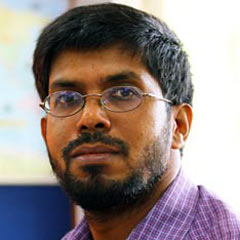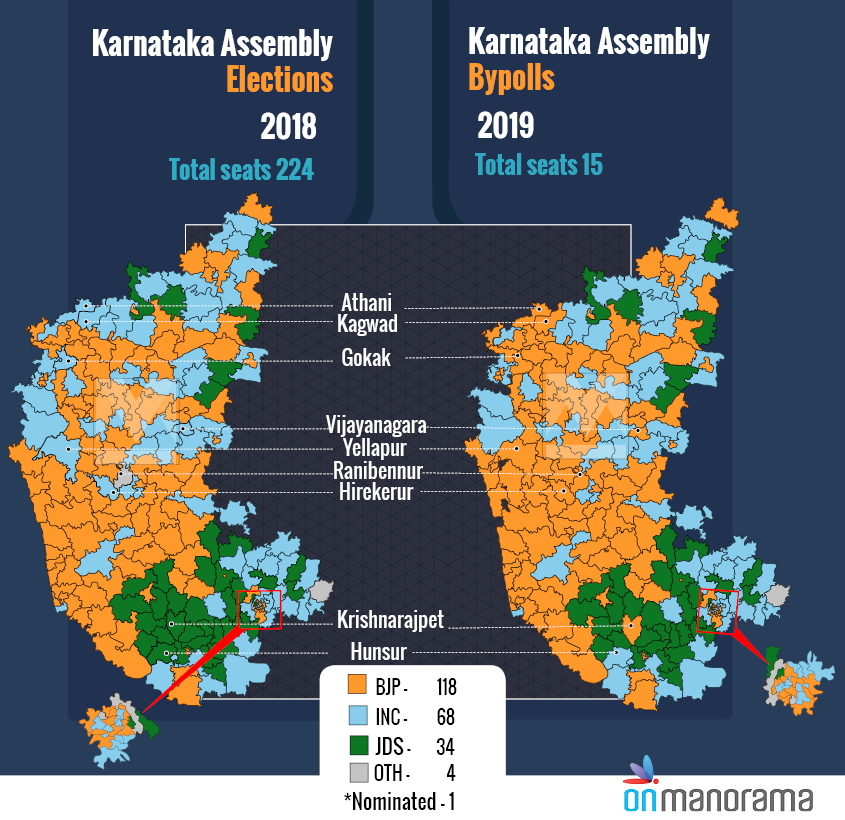The Karnataka by-election results declared on Monday that have resoundingly favoured the BJP marks yet another milestone in the inorganic growth of the saffron party in the only Southern State where it is in power. The BJP has bagged 12 of the 15 seats which went to the by-elections last week. With this, the BJP strength in the 222-member Legislative Assembly (two seats remain vacant) has increased to 117 and the government has thus secured a slender but clear majority.
Ever since the BJP made a mark in state politics in 1994 by emerging as the main opposition party, it has grown largely by engineering defections in the opposition ranks and by taking advantage of the disintegration of other parties. In 2008, it formed a minority government, the first BJP Government in the South, and then firmed it up by making some opposition MLAs resign and get them re-elected on its ticket. In a repetition of events, it came to power in July this year by engineering a similar defection in the Congress-JD(S) coalition of 17 MLAs causing the current round of by-elections.
The results are also significant for the BJP as it has opened its account in two of the Vokkaliga-dominated and JD(S)-stronghold southern districts - Mandya and Chikkaballapur – where its best efforts in the past to build its base had come a cropper. It has achieved the feat this time by simply making two strong opposition legislators defect to its side. A majority of the defectors who won on the BJP ticket are local satraps capable of winning their seats on the strength their patronage network irrespective of the party they are affiliated to. The BJP’s spread across Karnataka seems more complete now but this has not been achieved on its own strength, rather through back-door politics.
The voters seem to have preferred stability over rejection of political corruption in the by-elections. The opposition presented a moral narrative that the defectors should be taught a lesson as they were lured by the BJP by offering money and ministerial berths. Their disqualification by the Supreme Court was also a highlight of the opposition campaign. The voters, however, did not buy this argument and seem to have accepted the BJP’s promise of a stable government that only the victory of defected MLAs would bring about. The moral reasoning advanced by the Congress and JD(S) failed also because the coalition government of these two parties had made news more for their incessant internal squabbles and less for governance, an issue that the BJP amplified as part of its strategy.
The by-election victory has strengthened Yediyurappa’s position not only as chief minister but also as an unquestionable regional leader of the BJP. In a way, it was his personal victory rather than the BJP’s. He seems to have secured the support once again of the dominant Lingayat community that he belongs to. The party has won all the seats that went to the by-polls in the Lingayat dominated northern districts.
The Congress held 12 of the 15 seats that went to the by-polls but could retain just two of them. This drubbing at a time when the party was still recovering from the total rout in the 2019 Lok Sabha elections has rudely shaken its leadership structure in the State. Former Chief Minister Siddaramaiah, under whose leadership the party fought the by-polls, has resigned as leader of the Congress Legislature Party. KPCC(I) President Dinesh Gundu Rao has also announced his resignation. Siddaramaiah developed an iron grip over the Congress soon after he joined the party from the JD(S) in 2006. He further consolidated his position after he became the Chief Minister in 2013 and continued to maintain his stronghold despite the party’s defeat in 2018 Assembly elections and 2019 Lok Sabha elections. Although the “original” Congress leaders resented Siddaramaiah’s ascendance all these years, they could do nothing as Siddaramaiah enjoyed the blessings of the party high command. Monday’s results may mark the end of Siddaramaiah’s era in Karnataka Congress especially because he single-handedly picked the candidates for all the 15 seats.
The results have delivered the rudest shock to the JD(S). It is virtually a question of survival for the former Prime Minister H.D. Deve Gowda’s party as it failed to retain the seat it held earlier in its strong-hold district of Mandya. The erosion of its mainstay Vokkaliga support began during the Lok Sabha elections 2019. The Vokkaliga community, on whose support the JD(S) thrived, seemed to have resented the fact that the Gowdas promoted their family at the cost of other political leaders of the community. Now, the withdrawal of the Vokkaliga support to the party seems more widespread. An immediate revival of the party looks bleak as Deve Gowda is too old to rebuild the party, and his son and former chief minister H.D. Kumaraswamy’s political stock has been fast dwindling after he led the disastrous coalition with the Congress.

















